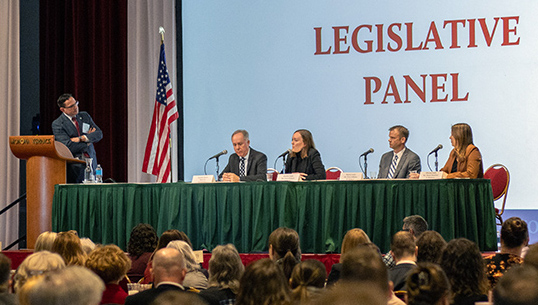A bipartisan panel of the Wisconsin State Legislature’s top leadership positions, including Assembly Speaker Robin Vos, Assembly Minority Leader Greta Neubauer, Senate Majority Leader Devin LeMahieu, and Senate Minority Leader Dianne Hesselbein, joined WHA’s 2024 Advocacy Day on March 20 in Madison for a discussion of this session’s top legislative issues impacting hospitals and health systems. WHA President and CEO Eric Borgerding moderated the discussion that covered issues ranging from health care coverage to post-acute care, state budget successes, and the health care workforce shortage.
“We know Wisconsin has a robust system of health care all around the state,” said Speaker Robin Vos. “Our outcomes are among the top throughout the country. That is something that we should all be very proud of,” he continued. Vos said he was especially proud of the work the Legislature had done to increase funding for health care in this session’s budget—about $250 million.
 L to R: WHA President and CEO Eric Borgerding (moderator), Assembly Speaker Robin Vos (R-Rochester), Minority Leader Rep. Greta Neubauer (D-Racine), Majority Leader Sen. Devin LeMahieu (R-Oostburg) and Minority Leader Sen. Dianne Hesselbein (D-Middleton).
L to R: WHA President and CEO Eric Borgerding (moderator), Assembly Speaker Robin Vos (R-Rochester), Minority Leader Rep. Greta Neubauer (D-Racine), Majority Leader Sen. Devin LeMahieu (R-Oostburg) and Minority Leader Sen. Dianne Hesselbein (D-Middleton).
Assembly Minority Leader Great Neubauer agreed. “We did get some good bipartisan things done in the state assembly this year,” said Neubauer.
“But there are major priorities for our caucus that we are going to continue to work on in the years to come,” said Neubauer. “That includes, of course, Medicaid expansion and concurrently increasing reimbursement rates to ensure that we both have great access to health care for Wisconsinites and you all are better able to make ends meet,” she said.
In the Senate chamber, Majority Leader Devin LeMahieu also noted being proud of securing higher disproportionate share hospital (DSH) payments for hospitals, a priority for WHA in the budget.
“It’s so important to have organizations like WHA, people that I trust, when they come into my office and explain to me what’s actually going on in health care and the challenges we are facing along with my local hospital administrators, so I can hear from them. It’s so vitally important,” said LeMahieu.
The legislators also agreed on the need to bring back a separate priority issue for WHA related to post-acute care that passed the Assembly but did not get through the Senate.
“I really thought we were going to get next of kin done that last day of session. I was really hoping we would because I think WHA did a really great job educating members of the Senate of how important that was,” said Minority Leader Dianne Hesselbein.
Speaker Vos agreed, “We are not done. We know there are a lot of issues that need to be addressed. I didn’t know a lot of the things that we began to work on until WHA took the time to educate me…The number of people who are stranded in a hospital where they are done with their care and they are ready to go somewhere else either to go home or to go to a nursing home or a rehab facility…and the cost that is has on the health care system for all of us."
Vos said he was pleased with the package of bills the Assembly passed that included WHA's next-of-kin" legislation which he hopes can be taken up at the very beginning of the next legislative session.
The panel also said they wanted to help policy makers address the workforce shortage facing the state, with Rep. Neubauer citing WHA's "Grow Our Own" graduate medical education legislation.
“We are really invested in making sure that we are educating people here in Wisconsin and providing A pathway for them to stay here in the healthcare workforce,” said Neubauer who also said she wants to attract more young people to Wisconsin's health care industry to deal with some of the demographics challenges our state faces.
Speaker Vos also chimed in on the workforce challenges facing our state, particularly on the demographics side.
“The problems that face Wisconsin are complex, but not unique to our state. We have a problem with workforce," Vos said. He said he was aware of the demographics challenges that make this an issue of particular importance to health care.
Senate Majority Leader LeMahieu said he agreed we need to make it more attractive for health professionals to come to Wisconsin by removing obstacles.
"Make it easier to get health professionals into Wisconsin, to let them practice to the full scope of their training….make it less expensive for them to live here by keeping their tax rates down, and make sure that there's affordable housing," said LeMahieu.